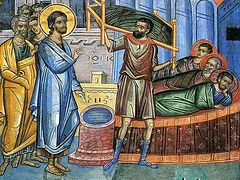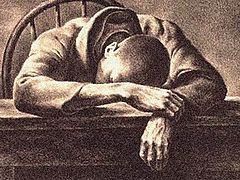Christ is Risen! Paralysis is the inability of the body’s members to have their properly ordained mobility. This is a succinct definition of the term paralysis. And today is the Sunday of the Paralytic. Today, the Fourth Sunday of Pascha, during the Divine Liturgy celebrated in Orthodox parishes worldwide—at the Holy Gospel from the fifth chapter of John—we hear about Christ healing a Paralytic man at the Pool of Bethesda, at the Sheep’s Gate in Jerusalem. This was, according to the Gospel of John, his infirmity for 38 years. To establish the significance of the miracle at hand we must repeat and remind, that on these Post-Paschal Sundays we celebrate Resurrected individuals. Individuals who were touched by Christ, who encountered Christ and who were transfigured by the impact of the encounter. The Holy Church, today, brings before us the Paralytic: a man who lay in front of the Sheep’s Gate pool for thirty-eight years in vain hope, waiting for one man to help him enter the pool at the time when, according to the tradition, an Angel would descend and stir the waters. As the Gospel proclaims, whoever stepped in first, after the stirring of the water, was made well of whatever disease he had. And yet the Paralytic, dragging himself over the stones, being trampled by people, was hopeless. If you would like a visual depiction of what this must have been like, the excellent (and free for viewing) series on Christ’s life called, The Chosen, in Season Two, episode four, is on the miracle of the Paralytic and is good to watch. The Paralytic was lost for thirty-eight years in hopelessness. When Christ ascended to Jerusalem for a particular Jewish feast, He sought out this man at the Sheep’s Gate pool, and finding him He asked: Do you want to made healthy? And the man said immediately not, yes Lord I wish to be made well, but, Lord, I have no man to carry me into the water. The passions and sins accompany humanity through the ages. People are people, and no matter what century or time they live in, they are infected with the same illnesses and the same sins. As was the case in Christ’s time, also today—a significant portion of mankind does not care about their neighbor, they are cold and indifferent to the plight of their neighbor. Many are lost in the prisons of their own making, of their own selfishness. The walls of these prisons are money, property, and the things of this life—none of which the soul can carry on to its eternal habitation. Every man and woman who has entered the world has need of a life-impacting, Resurrectional encounter with Christ; to be saved by Him from our indifference and our spiritual paralysis.
Indifference—this is a timeless sin and passion. And never has it been more acute than in our self-centered, egotistical society that imbues within us the idea that money and the accumulation of wealth are the purposes of man’s existence. We are in a race, a marathon to obtain wealth and to ascend the ladder of life’s successes and victories, to obtain better employment, a better home, a better vehicle. What is worse, much worse, is that within each one is engrained the desire to bury anyone who comes in the way of his vain plan. Whether you are the Queen or the average worker at McDonald’s or anyone in between or below that hierarchy, a common fate awaits everyone: the grave. What I described—our spiritual paralysis—is no different than the account of the Holy Gospel. The Pool of Bethesda was an intersection at Jerusalem that was well-traversed; it was a common intersection, laden with traffic. The temple priests used it as a washing basin for the animals to be used for sacrifice. And to the pagans of Jerusalem—the Romans and Greeks—it was also a sacred site, having once been the foundation of a temple to the Greek doctor-god Asclepius. Perhaps—and I diverge—but perhaps this is why Christ asks the Paralytic, do you want to be healed. The Greek word υγεία by strict definition means to be made whole. Those who have health have wholesomeness. In an age dominated by Pharisaical pride and religious hypocrisy, the common Israelite would not have been theologically sound. It is known that the Pharisees themselves mocked the idea that an Angel descended to stir the waters, healing the first person to enter the pool after the stirring. The common man, in his despair compacted by the hypocrisy he saw in the religious elite, would have sought healing in both Asclepius and the God of Abraham, Isaac, and Jacob. Who did the healing, he did not care. Asclepius was also known as Savior. When Christ the Savior asked the Paralytic, do you want your health, do you want to be made whole, the Lord was proclaiming Himself as Perfect God and Man, the Savior, the only One able to grant healing and wholesomeness.
Now I return to the point at hand. The man was by the pool for thirty-eight years, waiting for someone to carry him in. And despite the traffic dissecting the Pool at the Sheep’s Gate, not one person in thirty-eight years was found. Today, our indifference for the disabled, I would like to think, has slightly improved. Yet still, we generally neglect our elderly, our sick, our shut-ins. We are a society of vain, self-pleasing individuals, and we falsely assume that our duty to fellow man is served by government agencies and social services. The Lord commanded you to care for the sick and the elderly. That the government does so is a token of the Christian values and orientation of society. That is, in certain areas, the Christian values Western society once held are still manifest. However, consumed in our own day-to-day vanity, we pass the less fortunate ones by. Christ is waiting for us—not the government—to be the ones who give salt to the world, to preach the Gospel, to proclaim the Resurrection. Especially to those who are suffering and waiting at their own Pool of Bethesda. Providing material goods to such suffering ones is important, but even more important than that is that we give them from the spiritual treasure of our soul, which is Christ. The first pre-requisite to this, of course, is that we find Christ. And to find Him within we must seek healing from Him, in Holy Confession and Holy Communion. He is provoking us with the eternal question: Do you want to be made whole, do you want your spiritual and bodily health?
We spoke extensively on physical paralysis and the need to serve others. We said a word on the vain societal values, and the indifference which plagues modern man. Indifference, vanity, pride—these are the roots of the much more deadly, and much more serious spiritual paralysis which has overtaken the souls of modern men and women. For us, Orthodox Christians who know the truth, who know the joy of the Resurrection, who perhaps tasted the fruits of the Resurrection—it is impossible to not recognize our condition and to ask from Christ healing and wholeness. Christ is not waiting for us to say, I have no family, I have no good priest nearby, my parish community is not helpful—He is waiting for us to proclaim Lord, I believe, help my unbelief. He encounters us in the depths of the heart, in the mystical depths of our soul. I do not negate that Christ is manifest in the Church, and the Church is you—every one of you. We are the Body of Christ. We find joy in our intercommunion with each other, we see Christ in each other, and we must preserve the bond of love and peace between each other, rooted in Christ’s service; so that this light of the Resurrection can be a lighthouse on an island amidst the stormy seas of this life. We have only, with a deep faith inspired by the Truth of Christ’s Resurrection, to accept the power of Christ’s healing and saving grace. He is the Master of Worlds, Lord of the Universe, the Defeater and Vanquisher of Death. Immediately after the account of the Paralyzed Man’s healing, the Lord proclaims (John 5: 24-25): He who hears My word and believes in Him who sent Me has everlasting life, and shall not come into judgment, but has passed from death into life. Most assuredly, I say to you, the hour is coming, and now is, when the dead will hear the voice of the Son of God; and those who hear will live. Let us pray that we, who are the spiritually paralyzed and the spiritually dead, from our own personal Pool of Bethesda, might hear the Resurrectional voice of Christ saying to us, as of old to the Paralytic, arise, take up your bed—take your passions and sins and trample them underfoot, carry them out, throw them out. And now, walk. Walk in newness of life, walk in the light of the Holy Sacraments, walk in the truth of the Resurrection. Arise, take up your bed, and walk. Christ is Risen! Indeed He is Risen!




